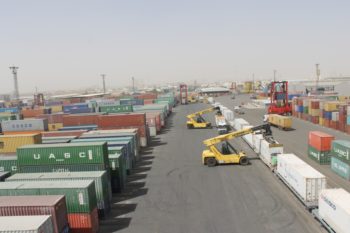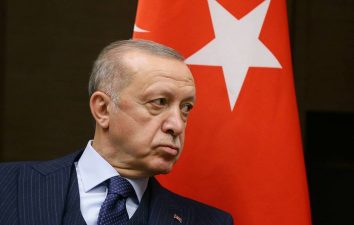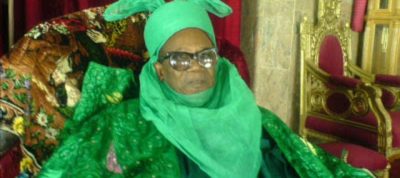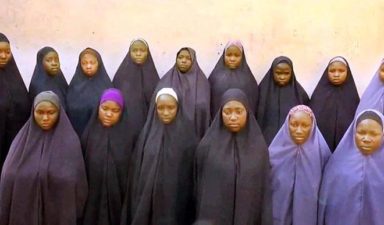President Muhammadu Buhari, last week Thursday, inaugurated what has become celebrated as Nigeria’s first inland dry port in the name of Kaduna Inland Dry Port (KIDP).
A dry port is an inland intermodal terminal directly connected by road, rail and air to a seaport and operates as a centre for trans-shipment of sea cargoes to inland destinations.
Kaduna State Government, under the leadership of Mallam Nasir el-Rufai, became the first Nigeria’s state government to ever think along that way at a time many other sister states still grapple in the darkness and backlog of unpaid salaries and physical development. Some governors however have made headways along other lines in ensuring a handshake by their respective states with greatness and that is obvious in Kano, Kebbi, Oyo, Osun, and Lagos is the leader of all that is called economic greatness so far in the economic journeying of Nigeria.
This media outfit, The DEFENDER, salutes the Kaduna State Governor, Mallam Nasir el-Rufai, for his giant stride at bringing in place, among his many achievements in two and a half years in office, the Kaduna Inland Dry Port as first of its kind in Nigeria.
The Nigeria’s first dry port experience, which is among the seven of its kind being promoted by the Nigerian Shippers Council (NSC), was built by the Kaduna Inland Dry Port Limited.
The facility has the capacity to handle 29,000 tonnes of cargo yearly in the first phase of operation. The Director, Special Duties, NSC, Mr. Ignatius Nweke, in a statement issued in Abuja last week Monday, said the yearly 29,000 tonnes of cargo might double upon the completion of the port.
According to the NSC Director, the Kaduna Inland Dry Port is also estimated to generate no fewer than 5,000 direct jobs at the commencement of operations.
Nweke had said, “The Kaduna Dry Port, which is the first of its kind in Nigeria, will receive cargo from the Apapa Port in Lagos through the railway or by road, and also export goods through the same channel.”
According to him, the idea of establishing inland container depots in the hinterland is informed by the need to reduce the congestion in Lagos ports and provide relief for the busy Apapa road.
Having been inaugurated by the President, the port would provide an easy process for the exportation of farm produce from Kaduna and neighbouring states as well as landlocked countries.
Kaduna State is the largest producer of ginger in the country, and as a result, the new port, located in Kakuri area of the state, will provide the opportunity for the exportation of processed agricultural produce to other countries of the world.
It is on this note that The DEFENDER will encourage governors of other states, particularly those depending solely on federal allocation, to look inward to tapping from available resources and develop same to lay solid foundation for their respective states’ economies.
…Plus Akeredolu and Ondo economy
This media outfit’s team was in Akure, the Ondo State capital, night of last week Thursday and found the entire place, with the exception of Oba Adesida Road, in darkness. The A-Division-NEPA-Oda roads area was in total darkness, while the Oda Road starting from Shoprite through the front of SARS, College of Health Technology to the Akure Muslim Community Eid Ground was still being in state of dilapidation.
One would wonder what the problem is with Ondo State’s new government of a man who is not only a former President of the Nigerian Bar Association but, more exposedly, a senior advocate of Nigeria (SAN).
Governor Oluwarotimi Akeredolu (SAN) is not only said to have acknowledged that all that he needed to do in the state capital, talking about infrastructure, had been done by his predecessor Olusegun Mimiko but also that it is waste of resources to continue to spend money on powering generators to provide street and road sides light in Akure, the capital of the South West’s only oil producing state.
Akeredolu however believes that paying workers salaries as at when due and planting of “thick” should be the priority of his government, which is great. Paying salaries timely will shoot Ondo State up to reasonable economic comfort being a civil service state. Ondo State, nonetheless, is far more than being a civil service state. As a coastal and oil producing state, Governor Akeredolu has got to look, like his Kaduna State counterpart el-Rufai, into the direction of sea port development. Like the Kaduna Inland Dry Port, an Ondo Sea Port will relieve Lagos State of vehicular pressures caused by heavy trucks and will relieve residents of stress resulting from heavy traffic in the state that is supposed to be the nation’s Centre of Excellence.
The Akure Airport also has the chance to make the state more economically viable than it is if the governor can work hand-in-hand with the Federal Government on that exploit. Akure also as a transit state, if Akeredolu can sit down properly with Economic Thinkers in the Ondo State, can make something out of its geographical positioning as centre between two big cities of Lagos and the FCT.
To finish with, Governor Akeredolu should rescind his position against powering of generators for streets light in the Ondo State’s major cities by pumping money into that area as street light has a way it aides security of lives and properties in any society. The governor should encourage more economic activities but ensure a steady and well monitored intervention to save his people from business people, like oil marketers, who are in business in parts of the country to over-maximize profit even when they realise doing so inflicts hardship on the people.




